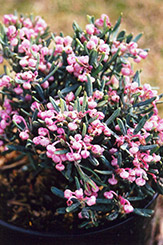Height: 24 inches
Spread: 3 feet
Sunlight:
![]()
![]()
Hardiness Zone: 1
Description:
A very small shrub for detail use in gardens, with bluish needle-like foliage and pink urn-shaped flowers in spring; very fastidious as to growing conditions, needs ample consistent moisture and highly organic soils, will not tolerate alkaline soil
Ornamental Features
Bog Rosemary features dainty nodding white bell-shaped flowers with shell pink overtones at the ends of the branches from mid to late spring. It has bluish-green evergreen foliage. The needles remain bluish-green throughout the winter.
Landscape Attributes
Bog Rosemary is a multi-stemmed evergreen shrub with a more or less rounded form. It lends an extremely fine and delicate texture to the landscape composition which should be used to full effect.
This is a relatively low maintenance shrub, and usually looks its best without pruning, although it will tolerate pruning. It has no significant negative characteristics.
Bog Rosemary is recommended for the following landscape applications;
- General Garden Use
Planting & Growing
Bog Rosemary will grow to be about 24 inches tall at maturity, with a spread of 3 feet. It tends to fill out right to the ground and therefore doesn't necessarily require facer plants in front. It grows at a slow rate, and under ideal conditions can be expected to live for approximately 20 years.
This shrub does best in full sun to partial shade. It prefers to grow in moist to wet soil, and will even tolerate some standing water. It is not particular as to soil type, but has a definite preference for acidic soils, and is subject to chlorosis (yellowing) of the foliage in alkaline soils. It is somewhat tolerant of urban pollution, and will benefit from being planted in a relatively sheltered location. Consider applying a thick mulch around the root zone in winter to protect it in exposed locations or colder microclimates. This species is native to parts of North America.
